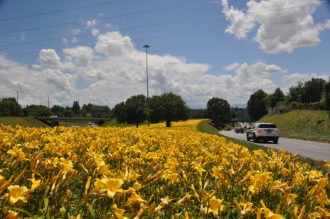On Aug. 31, the Buncombe County Tourism Development Authority board unanimously voted to award $5.9 million from its Tourism Product Development Fund to the Woodfin Greenway & Blueway. The funding represents the final amount needed for the $30 million project, which has been under development since 2011.
The money will go toward constructing 5 miles of greenway along the French Broad River and Beaverdam Creek, as well as park facilities and a wave feature for whitewater enthusiasts. Other support for the work has come from Woodfin town bonds, the N.C. Department of Transportation and Buncombe County government appropriations. (The TDA previously granted $2.25 million to the project in 2017.)
“The Woodfin Greenway & Blueway will create another riverfront amenity in northern Buncombe County that lessens impact on other areas and [creates] opportunities for visitor dispersal,” said Vic Isley, Explore Asheville president and CEO, in a press release announcing the grant. “It will also add four river access sites for all types of watercraft for residents.”
At more than $8.1 million, the TDA’s overall allocation to the project is its largest yet from the TPDF, which represents the 33% of occupancy tax revenues that state law requires to be spent on capital projects that increase overnight visits to Buncombe County. That distinction had previously been held by the city of Asheville’s River Arts District Transportation Improvement Project; the collection of greenway and riverfront projects received roughly $7.1 million.
Asheville climate justice program makes little impact
When former Asheville Chief Sustainability Officer Amber Weaver presented the results of the city’s Climate Justice Initiative in January, City Manager Debra Campbell called it “extremely, extremely important to all that we do.” Yet public records recently obtained by Xpress show that city staffers have made minimal use of the main tool to emerge from that effort.
The initiative, which kicked off in April 2020 after the city signed a $29,500 contract with Asheville-based Tepeyac Consulting, had culminated in a “Climate Justice Screening Tool.” According to an accompanying guide published by the city Office of Sustainability, the tool should be employed consistently across government operations “to identify, make and explain policy choices that build climate resilience” in minority communities.
However, the city provided just two documents when asked for all instances the tool had been used. Both had been filed by Vaidila Satvika, a member of Asheville’s Planning Design Department, regarding a redesign of Patton Avenue and a housing study.
“Since [January], efforts have focused on education, building capacity for technical assistance within the organization and identifying strategies for implementation,” wrote Asheville Sustainability Director Bridget Herring, in response to an Xpress request for comment. “We expect utilization of this resource to increase during the fiscal year.”
New plans under development support the city’s intent to use the tool more broadly moving forward. A draft framework for Asheville’s Municipal Climate Action Plan, released in late July, flags expanding and implementing the tool as “high-impact activities” for achieving climate and sustainability goals.
Community kudos
- Buncombe County’s Soil and Water Conservation District preserved over 156 acres of county farmland through conservation easements finalized this summer. The four properties, spread across Barnardsville, Fairview and Weaverville, include both pasture land and diverse forest ecosystems.
- The Polk County Community Foundation pledged $250,000 toward completion of the Saluda Grade Trail. The grant represents the first major gift for the estimated $60 million project, which aims to convert 31 miles of inactive railway into a mixed-use trail between Inman, S.C., and Zirconia.
- MountainTrue launched a new website to provide real-time estimate of E. coli levels in the French Broad River. The site calculates bacterial contamination based on measures of turbidity, which is tied to stormwater runoff, at Asheville’s Pearson Bridge. More information is available at avl.mx/bzi.
- WNC Communities inducted two local leaders into the WNC Agricultural Hall of Fame. Greg Hoyt, a longtime faculty member at the Mountain Horticultural Crops Research and Extension Center in Mills River, was honored for his work on soil conservation and sustainable agriculture. Dennis Niemeyer, a nursery owner and farmer, was recognized for his horticultural industry advocacy and promotion of native plants.
-

OUTSTANDING IN THEIR FIELD: The flower beds near Exit 4A on Interstate 240, maintained by local N.C. Department of Transportation staff, earned the William D. Johnson Daylily Award from the Garden Club of North Carolina. Photo courtesy of NCDOT The Southern Highlands Reserve in Lake Toxaway was selected by the U.S. Forest Service and U.S. Fish and Wildlife Service to lead red spruce restoration efforts throughout the Southern Appalachians. The nonprofit will raise 50,000 spruce saplings from seed to be planted on public lands throughout the region.
- Local N.C. Department of Transportation staff members earned praise for their decorative plantings on area highways in the 2021 Wildflower Awards, sponsored by the Garden Club of North Carolina. NCDOT Division 13, which covers Buncombe County, was recognized for having the best overall division wildflower program, while the flower beds near Exit 4A on Interstate 240 earned the first-place William D. Johnson Daylily Award. I-26 in Henderson County received second place for best regional wildflower planting in the Western Region.
Making moves
- Mountain BizWorks hired Amy Allison as partnership director for its WNC: MADE X MTNS initiative. Allison, who most recently served as director of the N.C. Outdoor Recreation Industry Office, will help develop the region’s outdoor economy by supporting rural community leaders and encouraging outdoor-focused businesses to relocate in WNC.
- Tracy Calla has been appointed as the new education director of Bullington Gardens. Formerly the senior manager of school and family programs at the Marie Selby Botanical Gardens in Sarasota, Fla., Calla replaces John Murphy, who retired after 23 years with the Hendersonville nonprofit.
- Local horticulturalist Greta Dietrich has opened Woodswise Botanicals in Mills River. The nursery focuses on native plants, with particular emphasis on medicinal herbs and pollinator-supporting species. Hours are Fridays-Saturdays, 10 a.m.-4 p.m., and Wednesday-Thursday by appointment. More information is available at WoodswiseBotanicals.com.
Save the date
- Young anglers have the chance to show their skills during a kids fishing tournament at Lake Julian Park Saturday, Sept. 17, 8 a.m.-noon. Prizes will be awarded in multiple age groups for longest fish, shortest fish and most fish caught, with a grand prize for overall longest fish. More information and registration are available at avl.mx/bzd.
- The Friends of DuPont Forest hosts the DuPont Forest Festival Saturday, Sept. 24, in the forest’s Guion Farm parking area. Activities at the free event include a kids bike clinic, a nature scavenger hunt and guided hikes. More information is available at avl.mx/bzh.
- Conserving Carolina begins a series of five guided hikes at locations throughout WNC Friday, Sept. 30, with a 6-mile trek at Mount Mitchell State Park. Other options include a 6.5-mile loop hike in the Pisgah National Forest Friday, Oct. 14, and an out-and-back excursion to Waterrock Knob Friday, Oct. 28. More information and registration is available at avl.mx/9sa.
- The WNC Sierra Club hosts its political committee chair, Ken Brame, for a Zoom program on the fall’s elections Thursday, Oct. 6. Brame will focus on state-level races and their potential impacts on the environment. Registration is available at avl.mx/bzf.
- The Organic Growers School has scheduled its spring conference for Friday-Sunday, Feb. 24-26, at Mars Hill University. The Asheville-based nonprofit is seeking recommendations for conference speakers and topics, with an online feedback form available at avl.mx/bt5.




I’m curious as to why all those who were complaining about the TDA expenditures at the US Tennis Open are not commenting on the $5.9 million TDA has just contributed to the Woodfin Greenway & Blueway. project. I’m also curious as to why previous contributions to the $30 project were made by the TDA.